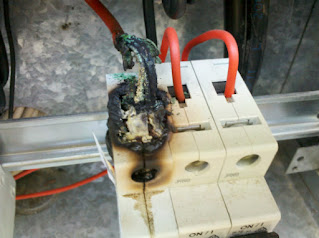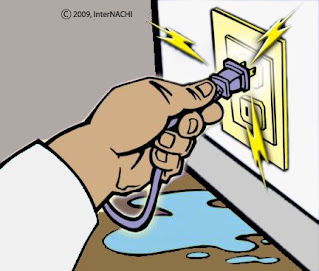Short Circuit
A short
circuit is an electrical circuit that allows a current to travel along an
unintended path with no or very low electrical impedance.
A common
type of short circuit occurs when the positive and negative terminals
of a battery are connected with a low-resistance conductor, like a wire. With a
low resistance in the connection, a high current will flow, causing the
delivery of a large amount of energy in a short period of time.
Main Causes
There are
several causes for short circuits, including three that are most often to
blame.
Faulty Circuit Wire Insulation
Old or
damaged insulation may allow neutral and hot wires to touch, which can cause a
short circuit. Nail and screw punctures, as well as age, can cause wire casings
or insulation to deteriorate and create short circuits. Or, if animal pests
such as mice, rats, or squirrels gnaw on circuit wiring, the inner wire
conductors can be exposed to
cause short circuits.
Loose Wire Connections
Attachments
can loosen, sometimes allowing neutral and live wires to touch. Fixing faulty
wire connections is tricky and is best handled by those thoroughly familiar
with wiring work.
Faulty Appliance Wiring
When an
appliance is plugged into a wall outlet, its wiring effectively becomes an
extension of the circuit, and any problems in the appliance wiring become
circuit problems. Old or broken appliances can develop inner short circuits
over time. Short circuits in appliances can occur in the plugs, in the power
cords, or inside the device itself. It’s best to have a technician look at
shorts in larger appliances such as ovens and dishwashers. Smaller appliances
such as lamps often can be rewired yourself.
Types of Short Circuit
In general
terms, a short circuit is any condition where the establish wiring circuit is
interrupted by a flaw in the wiring or wiring connections. Actually, though,
there are two situations that both qualify as short circuits, although they
carry different names.
Short Circuit
The
term short circuit is most commonly used by electricians to refer to
the situation in which a hot wire carrying live current touches a neutral wire.
When this happens, resistance lessens instantly and a large volume of current
flows through an unexpected pathway. When this classic short circuit occurs, sparks
sometimes fly, you may hear crackling, and sometimes smoke and flames ensue.
Ground Fault
A ground fault is
a type of short circuit that occurs when the hot wire carrying current comes
into contact with some grounded portion of the system, such as a bare copper
ground wire, a grounded metal wall box, or a grounded portion of an appliance.
As with the classic short circuit, a ground-fault
causes resistance to instantly lessen, which allows a large amount of
unimpeded current to flow through the unexpected pathway. Here, there is less
chance of flame and fire, but a notable chance of shock.











No comments:
Post a Comment